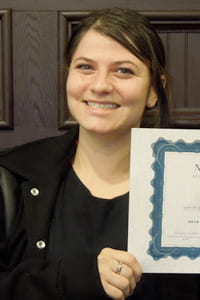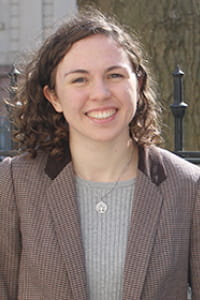Dyson College Institute for Sustainability and the Environment
Lessons in Legislative Action
Working with New York State lawmakers, Pace environmental clinic students have successfully initiated new legislation to reduce pollution from road salt.
W hile sodium chloride, aka salt, helps ensure our safety by effectively keeping vital roadways clear of ice and snow, it also poses a significant environmental risk. All that road salt—millions of tons, according to US Geological Survey data—washes directly into streams and lakes. It’s harming plants and wildlife, and contaminating our drinking water.
Enter Pace University’s Environmental Policy Clinic, a course offered by the Dyson College Institute for Sustainability and the Environment (DCISE). Clinic students have come up with a strategy for tackling the dilemma of how to maintain wintertime public safety in an environmentally responsible way. Their proposal—to develop specialized training for anyone responsible for applying road salt—was introduced in both houses of the New York State Legislature earlier this year. If both bills pass and the governor signs the legislation, New York will become the first state to require the creation of such training, which would be offered voluntarily.
“The training program would teach the applicators about the environmental and health risks associated with road salt usage,” said Brennan Boudreaux ’21, Global Studies. “Furthermore, these training programs can enhance efficiency since the road salt often remains on the ground for weeks with no snow, and it is sometimes applied when weather is too cold for it to have any effect.”
Boudreaux was one of seven Environmental Policy Clinic students in Pleasantville. Together, they developed the language of the legislation and advocated for support.
“I took charge in narrowing down what exactly the bill should target and what was reasonable and effective,” said Boudreaux. This included identifying and contacting relevant agencies and organizations—including experts from Cornell University and the Cary Institute—and meeting with lawmakers. The legislation, Assembly Bill A8067 and Senate Bill S6519, was formally introduced by Representative Thomas J. Abinanti (D) and Senator Peter Harckham (D).
According to Director of Programming, DCISE and Clinical Associate Professor Michelle Land, it’s the hands-on experience and real-world outcomes that make the Clinic a unique learning experience. She has run the course since 2014, along with John Cronin, senior fellow for environmental affairs, DCISE.
“We teach students professional advocacy skills and then place them in the policymaking domain to apply those skills on timely issues, through lobbying, testifying at hearings, providing comments on proposed regulations, preparing briefing memos for government officials, and more,” said Land. “We know of no other program like it at the undergraduate level.”
Previous policy clinic projects have included New York State’s Elephant Protection Act, prohibiting the use of elephants in entertainment acts, including circuses, carnivals, parades or trade shows. Legislation that Pace students helped to draft and petition was ultimately signed into law by New York State Governor Andrew Cuomo on October 19, 2017.
“Taking the action steps, speaking up, going to Albany, planning, diving deeper into research, and making revisions, allow the idea of making a significant impact to be within arm’s reach,” said Boudreaux.
For the road salt legislation to move forward, it will be up to the next class of policy clinic students to keep the pressure on during the upcoming legislative session. They will be working on continued lobbying and advocacy efforts, said Land.
DCISE: The Class of ‘19 Difference-Makers

Alexxis Granger ’19

Carly Sheinberg ’19

Christina Thomas ’19
Alexxis (Allie) Granger ‘19, MA in Environmental Policy
Granger held transformative internships at Riverkeeper and the Humane Society of the United States, and an externship at the United States Congress.
Carly Sheinberg ’19, Environmental Studies
Sheinberg was honored with a GreenPace Award for her work assisting Pace in meeting its commitment to sustainable practices. Sheinberg is a founding member of the Pace Sustainability Initiative, through which she actively collaborated with administrators and partners on efforts to minimize the University’s environmental footprint.
Christina Thomas ’19, Economics and Environmental Studies
Thomas worked in the New York City Mayor’s Office of Resiliency and Recovery as part of a one-year paid internship.

